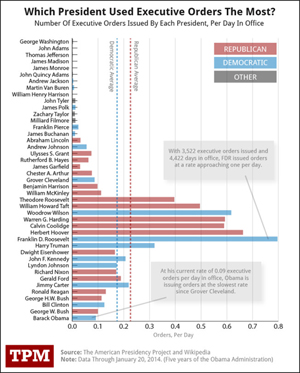*This is a cross-post from another blog, the Occasional Planet.
 There’s an adage that all politics is local. It makes a lot of sense; most issues are bread and butter ones that occur in the neighborhoods and the households where we live. But like all aphorisms, it’s not always true.
There’s an adage that all politics is local. It makes a lot of sense; most issues are bread and butter ones that occur in the neighborhoods and the households where we live. But like all aphorisms, it’s not always true.
The current dispute between House Speaker Boehner and President Obama about who is most faithful in carrying out his responsibilities to follow the Constitution lends itself to another maxim: “All politics is politics.”
Boehner started it all with a threat to sue the president because he [the President] is issuing too many executive orders where Congress has not passed legislation authorizing him to do so. Boehner outlined his reasoning in an op-ed that he penned for CNN.
Too often over the past five years, the President has circumvented the American people and their elected representatives through executive action, changing and creating his own laws, and excusing himself from enforcing statutes he is sworn to uphold — at times even boasting about his willingness to do it, as if daring the American people to stop him.
Boehner feels, perhaps justifiably, that the president is not paying proper homage to Congress. As far as Boehner is concerned, it should not matter that the current 113th Congress has passed virtually no meaningful legislation. He does not like the president taking executive actions to clarify and streamline immigration, to raise and expand the minimum wage, to clear up uncertainties in the Affordable Care Act, etc. But Boehner acts as if Barack Obama is the first president to use executive orders. That is far from true.
Obama has enacted 182 executive orders; hardly an “imperial president” when compared to others. His predecessor, George W. Bush enacted 291. Republicans Ronald Reagan and Dwight Eisenhower had 381 and 484 respectively. And Republican Theodore Roosevelt, in less than two full terms, enacted 1,081. His distant cousin, Democrat Franklin D. Roosevelt issued 3,522 in three plus terms.
So, if Boehner is making a constitutional argument (against a president who is a professor of constitutional law at the University of Chicago), he [Boehner] seems to be overlooking much of history. Barack Obama is acting well within the bounds of custom in the number of executive orders that he has issued.
It may not matter how much or how little Boehner knows about the Constitution. Like virtually every politician, he has never been known to fight a constitutional battle that would not give him political gain. And as Boehner has chosen to engage in this legal battle, Republican strategists are thinking about making it their main issue in the 2014 general election. Make no mistake about it, this is a political issue.
In defense of the President, Sally Kohn writes in CNN about Boehner:
Think about this for just a second: House Republicans are using taxpayer dollars to fund a lawsuit against a President who has literally done not only what every president before him has done but has done it less often and is doing so now only because House Republicans repeatedly refuse to even vote on legislation, let alone pass anything.
And you have the gall to accuse the President of being the one in violation of the Constitution?
Even more frustrating is how your repeated attacks on the President fall factually flat. In your essay for CNN, you write: “After years of slow economic growth and high unemployment under President Obama, they are still asking, ‘where are the jobs?’ ”
This is a particularly laughable assertion given last week’s jobs report, which noted our economy added 288,000 jobs in June, marking 52 straight months of continuous job growth. Overall, under President Obama’s leadership, the private sector has added 9.7 million jobs and an economy that was in free fall when he was elected is now in a steady recovery.
Kohn makes a familiar point: It’s likely that, because Boehner’s House has refused to act on so many legislative proposals, he is as derelict in following his constitutional duties as the president might be. The bottom line is that if either Boehner or the President has a legal case on the other not fulfilling his oath of office, the adjudication of the issues would be: (a) extremely difficult to make, (b) subjective in substance, and (c) basically political in nature.
The tendency to “vote” politically has been repeatedly shown by the U.S. Supreme Court since Bush v. Gore. As many legal observers have said, the rulings on recess appointments, Hobby Lobby, and a host of other cases show the justices voting along both party and partisan lines. It’s time that we get over it. The Supreme Court, the Congress, and the President all tend to bend in the direction of their political views. It’s hard to say that any of us would not do the same.
What we need to do now is to name it [political decision-making], acknowledge it for what it is, and get used to seeing it this way. If the Constitution was as pure as some might want us to believe, then perhaps that wouldn’t be so. But the framers of the Constitution were human and were also political [clearly biased in favor of the white landed gentry]. Let’s accept this and move on from there.

